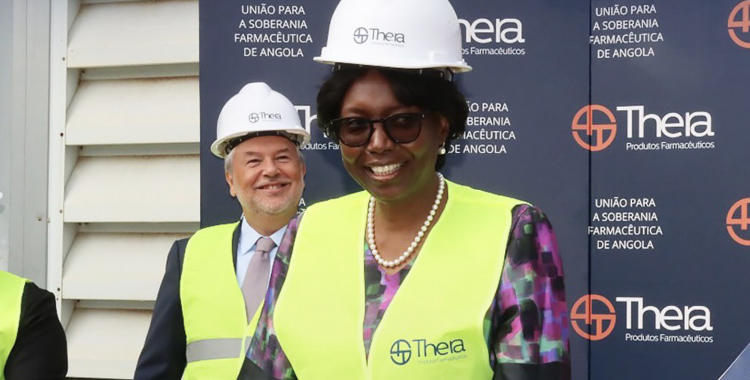"We are here just finalizing the administrative issues and those related to the financing for this project, but it will begin at the end of this year or the beginning of next year and in 2027 we will certainly have our Quality Control Laboratory up and running, because it is already included in the 2025 State Budget", said the head of the Health Ministry, as part of the laying of the cornerstone of the future Thera Produtos Farmacêuticos unit, which will be installed in the Special Economic Zone (ZEE).
According to a statement from the Luanda-Bengo ZEE, to which VerAngola had access, the laying ceremony took place on Monday morning and was witnessed, in addition to Sílvia Lutucuta, by prominent figures from the public and private sectors, such as the chairman of the Board of Directors (PCA) of the EP ZEE, Manuel Pedro.
The project is expected to begin production in July 2027.
"The project, considered strategic for the development of the pharmaceutical sector in Angola, is expected to begin production in July 2027. The new unit will have cutting-edge technology and production processes aligned with international quality and safety standards," the note says.
On the occasion, the minister also highlighted the importance of this project for Angola, considering it as "a significant step" towards "sovereignty" in the area she manages.
"This investment is part of the priorities of the Angolan Executive, which aims to create conditions for private investment and foster the growth of the national pharmaceutical industry. We believe that, with this unit in the ZEE, we will have access to quality and certified medicines, reducing dependence on imports," said Sílvia Lutucuta.
According to Angop, at this moment, to make up for this deficit, there are mini-labs supervised by the Regulatory Agency for Medicines and Health Technologies (Armed) that control the quality of the most frequently used products, in addition to using reference laboratories such as the one in Zimbabwe, certified by the World Health Organization.
According to the Minister of Health, quoted by Angop, who did not disclose the amount that the State will save with the production of medicines at a national level, more than 300 million dollars are spent annually by the country in the main areas of health, highlighting public health, malaria, HIV, tuberculosis, reproductive health, chronic non-communicable diseases and vaccines.
Thus, she said that antimalarial, antiretroviral, tuberculosis and chronic non-communicable disease medicines will be produced, among others such as serums, analgesics, etc.
As part of initiatives to support the private sector, he explained that the Executive has established a necessary ecosystem with more accessible regulations, always monitoring quality and complying with international standards, which includes the pharmaceutical industry.
"In this context, the President of the Republic has been very concerned about this segment of our sector, which is the pharmaceutical industry, because at this time we import everything and importing medicines is increasingly difficult to meet the needs of the market. Having serious interlocutors here with quality medicines fills part of this deficit," she said.
"In addition to the manufacture of medicines, we have been encouraging the manufacture of vaccines, which is also of great importance for us, for our continent, especially because there are initiatives in the African Union to encourage the pharmaceutical and vaccine industry here on our continent," she added, quoted by Angop.
Rafael Prata, CEO of Thera Produtos Farmacêuticos, said that the project "represents a firm commitment to the economic and social development" of the country.
"The laying of this cornerstone symbolizes the beginning of a journey that will generate jobs, transfer knowledge and position Angola in the international pharmaceutical market," he said, quoted in the ZEE note.







